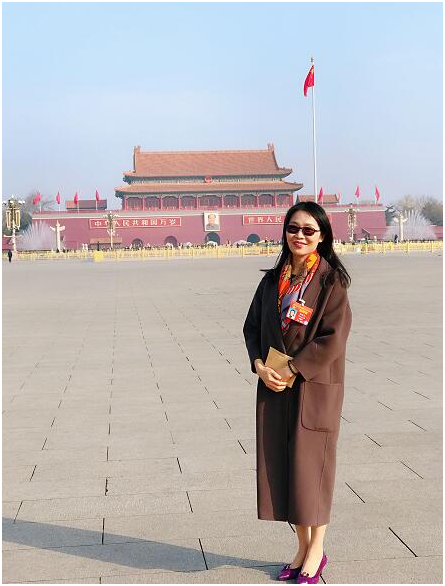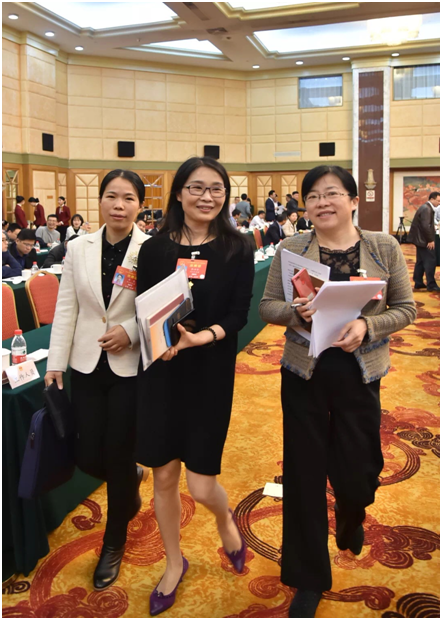"It is impending to build up talents teams due to shortage of general practitioners, gynecologists, pediatricians, psychiatrists, geriatricians and nursing talents in medical services." On March 6, ZHANG Zhifen, deputy of the National People's Congress of PRC and President of Hangzhou Women's Hospital called for strengthening teambuilding of needy medical talents during the interview by journalists of Zhejiang Business.

Ms. ZHANG said demand of medical services had been changing recently—
To start with, the implementation of two-child policy in full wing. The increasing women of advanced reproductive age and pregnant women of high risk lead to obvious rise in more high-risk infants, greater rate of complications and higher risks of birth defects in perinatal infants, which gives huge stress on Department of Gynecology and Obstetrics, Pediatrics Department and NICU.
Secondly, the ageing of population. In 2017, the ageing population reached 241 million and will increase to 487 million accounting for 34.9% of total population. Based on preliminary statistics, China needs 12 million nursing staff but the fact proves there are only less than one million staff, 20,000 of which have the vocational qualification for ageing nursing.
In addition, community ageing services, shortage of grassroots general physicians and nursing staff have become the bottleneck in the implementation of policies such as community signing, grassroots first treatment, layered treatment and dual referral. Meanwhile, reform and innovation of modern diagnostic and treatment technology development raise brand-new demand for interdisciplinary technology talents.
Ms. ZHANG said shortage of talents mainly resulted from small practitioners base, insufficient output and serious staff turnover.
1. Small needy practitioners base. According to China Public Health Statistics Yearbook, there are about 60,000 general practitioners, accounting for 3.5% of total (assistant) practitioners, far behind the ration of 30% to 60% in the world; pediatricians only account for 3.9% of total practitioners, which means 0.46 pediatrician for every 1,000 children, about 1/5 to 1/10 of that in European countries and USA. There are about 3 million registered nurses with a physician-to-nurse ratio of 1:1.4, far behind the international radio of 1:2.7. There are over 20,000 psychiatrists in China, about 1.49 in every 100,000 people, far behind the international radio of 4 in 100,000 in the psychology health industry. What's worse, two-thirds counties and districts have no psychiatrists at all. And there are 76,000 anesthesiologists in China, i.e. less than 0.65 for every 100,000 people. Many county-level hospitals have only one anesthesiologist on the post.
2. Severe shortage in output of needy talents. On one hand, medical schools do not cultivate enough talents, for example, most medical schools replace the major of pediatrics by unified clinic medicine. On the other hand, lack of attractions in the needy posts leads to fewer people (therefore even fewer talents) after graduation.
3. Serious needy talents outflow rate. General practitioners, gynecologists, pediatricians, psychiatrists, geriatricians and nursing talents are hard-hit area in the medical health industry with great outflow rates due to tense doctors-patients relationship, low remuneration, heavy workload, great work pressure and low post recognition from the society. It is investigated that the outflow rate of nurses in national tertiary hospitals of China is 5.8% on average (12% at most), even 8%-10% of outflow rate in developed regions such as Shanghai and Guangdong. The outflow rate of pediatricians reaches 48.6% in recent three years.

Ms. ZHANG proposed four points in view of the above:
I) We should establish an improved cultivation systems for needy talents . Firstly, as for higher education in medical schools, well-off regions and colleges can work on setting up more needy specialty settings and larger scale and adding more training contents of needy specialties in course system settings to cultivate needy talents directionally. Secondly, as for medical education after graduation, we should expand the recruitment scale of residents standardized training of needy majors. In this way can we prepare well for transition from a professional postgraduate to resident standardized training and specialists standardized training to shorten the cultivation period for talents of needy specialty. Thirdly, to provide post transfer training for professionals also lays a foundation for them to transfer to other needy specialty. And we should strengthen capability cultivation of needy specialists on the post for better working capability.
II) We should also propel policy enactment and implementation along with medical education. Education and Public Health Departments shall also closely work together to scientifically amend talents cultivation programs, standardize clinic teaching management and strictly require students reach graduation standard based on medical education rules and characteristics of industry demands; strengthen construction of clinic teaching base of medical schools, improve construction standards of affiliated hospitals and teaching hospitals of higher education, consolidate qualification management, to better cultivate talents of medical industry for sustainable enhancement of school education and post-graduation education teaching standards; strengthen education of humanities in medicine to include moral education throughout the process of talents cultivation; propose cultivation programs and specific requirements on talents of high level, basic application, in need and health industry; gradually establish high standard and level cultivation system for clinic medicine talents to accelerate well-structured teambuilding of medical talents of good morality.
III) We should promote attractions of needy posts. To start with, improve medical environment. Improve medical health industry, especially the social image of needy talents such as general practitioners, psychiatrists, pediatricians and nursing talents; improve physicians' working environment, apply reasonable laws to protect the legitimate interests of medical and nursing staff. Secondly, give priority over title promotion, guarantee personnel public institution and remuneration of needy posts, give policy inclination in title promotion (refer to the act to encourage the person qualifying residents standardization training to work in grassroots medical health organs) to encourage medical talents to engage in needy specialties by allowing them to take Medium Qualification Test for Health Professional Technicians in advance and even have priority over recruitment under the same conditions. Thirdly, guarantee their remuneration. The distribution mode by business income assessment performance greatly destroys enthusiasm of professionals such as pediatricians. It is suggested that a performance distribution mode should be based on work load and business load to ensure remuneration of talents of needy specialty.
IV) We should ensure staffing structure and investment. Firstly, ensure staff percentage of needy posts. The needy specialties such as Pediatrics Department, Department of Psychiatry and Department of General Medicine are usually those with weaker profitability. General hospitals should explore reasonable operation mechanism from overall situation consciousness and social responsibility to guarantee property investment of professional departments and reasonably plan the construction of talents. Health administrative departments will take settings, staffing, money and instrument investment of needy specialties into examination of public of public hospitals and level assessment of hospitals. Secondly, more investment in training and cultivation of needy talents. Financial departments of all levels will set up special funds for needy talents cultivation and training, establish dynastic adjustment mechanism suitable to social economic development level to set up corresponding majors, strengthen related courses, expand cultivation scale and enhance post capability to cultivate practical needy professionals.
Reposted from World Zhejiang Business Website
Source: World Zhejiang Business Website, Hangzhou People's Congress